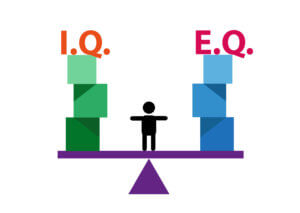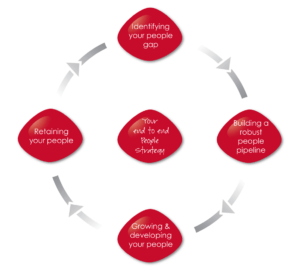
In my blog last week I shared a simple model to help you build a pipeline of promising performers. It was based on the 2Ps: Performance and Potential, and looked at the WHAT, the HOW, the CAPABILITY and the ASPIRATIONS of an individual.
Now this is a good exercise to complete on your existing people as it will give you a clear picture of where your developmental efforts should be applied, where your people potentiality lies, and where your people gaps are.
But what can you do to ensure your new hires fit the category of a ‘promising performer’?
Or more specifically, what can you do during the recruitment and selection stage to spot your future shining stars?
Have you heard the mantra hire for attitude and train for skill?

One core element of your ‘people’ proposition should be hiring individuals whose personal values are in sync with the values that make the organisation tick. In this scenario, character counts far more than their credentials.
Now don’t get me wrong. If you need to recruit a technically qualified individual, an accountant for example, then yes clearly the individual must be a qualified accountant in order to fulfil the requirements of the role from day 1. This is a no brainer. But once they’ve met this basic requirement of the role, you can still apply the mantra hire for attitude and train for skill.
The hiring dilemma of EQ vs. IQ

What’s the difference between EQ and IQ?
IQ, or intelligence quotient, is a number derived from a standardised intelligence test. You’ve probably heard someone say ‘her IQ is 90’ or “his IQ is 120’. IQ represents various measures of intelligence including short-term memory, analytical thinking, mathematical ability, mental ability and agility.
Lewis Terman (1916) developed the original notion of IQ scores with a score of between 90 – 109 being the norm or average and a score of over 140 being pure genius!!
EQ, on the other hand, is a measure of a person’s level of emotional intelligence. EQ focuses on a person’s ability to perceive, control, evaluate, and express emotions including evaluating and perceiving how others feel.
But what’s more important, a strong CV (IQ) or a high emotional intelligence (EQ)?
Technical skills and qualifications, industry expertise, innovation are hard skills which make a CV stand out, but ultimately they’re only one part of the equation.
According to Harvard Business Review, emotional intelligence (EQ) is “the key attribute that distinguishes outstanding performers,” and is the leading differentiator between employees whose IQ and technical skills are approximately the same.
A 2015 study by TalentSmart found that EQ is responsible for 58% of your job performance and that 90% of top performances have a high EQ.
So you may thinking ‘this is all great stuff Royston, but I’m about to interview a number of candidates all with strong CV’s, how do I gauge their emotional intelligence if I should be hiring for attitude?’
I get it.
We’ve all been there…sat opposite a candidate with our list of interview questions ready to identify if this person matches the drive, values and personality we’re looking for. From the process we must determine whether they will fit our culture, bond with the team and ultimately are they the right person for the job.

Over the next hour, the typical flow of the interview will play out as follows…
…tell me about yourself
…what are you currently doing
…what can you bring to the role
…tell me when you’ve XYZ / ABC
…any questions for us?
…the END.
Now this approach may serve you well, and if you include some values based interview questions, for example…
… ‘what would you do if you had to work with a person you din’t get along with’ or
…’how would you react if your team received negative feedback about a part of the project that was entirely assigned to you’
then you’re heading in the right direction to identify candidates who share the same values as your organisation.
But I want to share with you three questions you should ask all candidates right at the beginning of the interview.
- What do you know about our business?
- What questions do you have for us?
- Why you?
Why these three questions?
Because you’ll immediately learn three things about them which are not included in their CV.
#1 How well prepared they are.
Being prepared takes time & commitment and the pay-off is answering with passion, enthusiasm and confidence, ultimately demonstrating whether they are a serious contender for the job.
#2 How they deal with the unexpected.
If a candidate is thrown because they were expecting a more conventional interview structure then their response mechanism will be a good indicator of how they cope with pressure and unexpected circumstances.
#3 How they take control.
Giving the candidate the opportunity to exert influence over the interview process from the beginning allows them to;
· Clarify their value message (here’s how I can help your company)
· Match their skills to your business (I see you offer XYZ, my 10 yrs. experience is in XYZ)
· Showcase additional skills and value (I notice you don’t operate in X country, is this part of your future plans. I have experience working in X country…).
Turning the interview process on its head and asking the candidate; what do you know about our business, what questions do you have for us and why you, at the beginning of the interview is the moment when they stop being ‘just another interviewee’ and start being a legitimate job candidate.
Remember, hire for attitude and train for skill.
Share in the comments below, your examples of interview questions (the good, the bad and the ugly!) which support the mantra hire for attitude and train for skill.
The end-to-end lifecycle of a people strategy

Over the past few weeks I’ve focused my blog on the end-to-end lifecycle of a people strategy. Recruitment and selection is just one component. Check out my other blogs on this topic; identifying your people gaps, building a robust people pipeline, grow and develop your people, retain your people.

